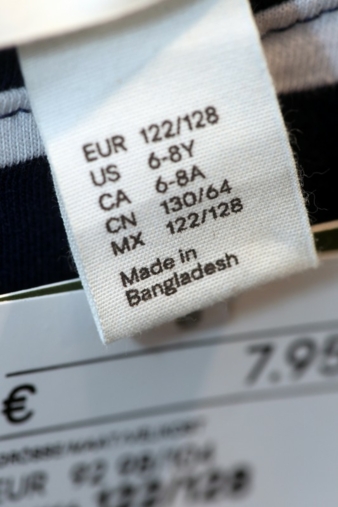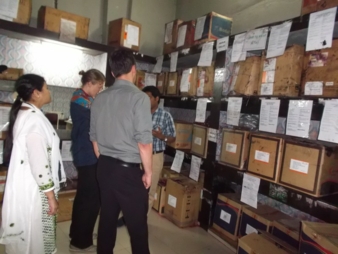16/03/2015 — auf Deutsch lesen
Keep an eye on chemicals
Bangladesh and its textile industry – social evels, problems with occupational health and safety, ailing factory buildings and environmental pollution caused by an extensive and improper use of chemicals or missing waste water treatment are intensively discussed. A Public Private Partnership (PPP)-Project focused on chemical management.
Numerous companies in Bangladesh or other producing countries in a similar situation are motivated to produce sustainably and want to care for the environment and the health of their employees. To realize their aims they do not need big promises but concrete assistance to optimise the daily production routine. For that reason, the company gsm Global Sustainable Management GmbH, headquartered in Cologne, Germany, has started a Public Private Partnership (PPP)-Project with focus on chemical management in spring 2012. This was well before the textile industry made headlines with the collapse of the Rana Plaza building.
“To achieve sustainable improvements, it is necessary to explain to manufacturers why they should do certain things. Therefore, it is essential to know the flows and processes and work closely together, gsm project leader Florian Tiedtke explains the procedure. Together with its local partner, the Bangladesh Centre for Advanced Studies (BCAS), gsm has advised and trained selected textile companies from different areas of textile production and with different starting conditions. This project is co-funded by the Deutsche Entwicklungs- und Investitionsgesellschaft (DEG) from public resources of the Federal Ministry for Economic Cooperation and Development (BMZ).
The project aims to give producers practical tools and methods to control the use of chemicals and to avoid harmful substances already in the procurement as well as during the production processes. This reduces the impact on the health of employees and consumers and on environment. Considering the complex textile value chain, is no easy task. Meanwhile the necessity to do this is generally recognised. Fashion companies, NGOs and organisations of development cooperation have committed to contribute to this strategy, but still have enormous difficulties to put it into practice.
Development work on-site is needed: In order to identify the improvement needs, gsm and its partner immerse deep into the production processes of the different companies. „Sometimes you have to dirty your hands in the production to understand a problem“, so Florian Tiedtke says. The status analyses on-site clarify, that approaches for a preventive avoidance or reduction of harmful substances already exist, but that there is a lack of stringent systems and detailed knowledge.
Some of the deficiencies would have been found also in standard audits. But: The resulting corrective actions should have been done without assistance. And right here is the difference. „We wanted to train, advice and support. It is important to illustrate, which are the consequences of certain procedures and why certain activities should be changed. Otherwise it doesn’t work“, emphasises Tiedtke.
First it was necessary to fill existing knowledge gaps. Employees, previously nominated as responsible for chemical management, have been trained on Restricted Substances and their impacts on humans and environment just as on corresponding risks in the value chain. Equipped with new awareness and knowledge, they build up together with gsm-experts individual structures to manage the chemicals in the production routine, to avoid or reduce them as soon as possible and to get to know corresponding alternatives to substitute them.
Especially the evaluation of materials, quality checks of different information carriers just as the risk classification of chemicals are complex tasks, which have to be practiced intensively. Also the management of inventory lists just as the storage and handling of chemicals had been important training contents. The learning practice was very individual, preferred with strong practical relevance. During the joint training sessions, it became apparent, that the different performance levels concerning chemical management stimulate each other. The weaker ones could profit from the experiences of the more advanced factories and get to know the advantages of the changes.
At the same time, the education of local competence was brought forward on a superordinate level. Thus, staff members of BCAS are trained intensively in the identification and evaluation of chemical substances, preparations and components. Within a short period, they had found acceptance as competent local contact persons.
Of course not everything ran smoothly. The political situation around the presidential elections in January 2014, the catastrophe of Rana Plaza in 2013 and its consequences delayed the project. Intense unrests und conflicts followed by strikes and demonstrations not only in Dhaka but all over Bangladesh sometimes stopped public life completely. The textile industry came under increasing pressure. Conflicts about a raise in the minimum wage just as safety aspects provoke strikes, factory occupations and closures. At the same time manufactures had to produce with high pressure to overcome delivery delays caused by the unrests. There was no time left for the implementation of new company structures.
Sometimes project management and the local experts learned about their own limits. For example, if the high fluctuation of staff – not only in the worker level, but also in the middle and upper management – made it difficult to anchor firmly the newly acquired knowledge in the company. Or for example, where the corrective actions were only perceived as single actions rather than as recurring processes, which should be integrated in the daily work. Here the trainers could only give impulses. For a long-termed change of awareness, the company itself, or more precisely the management, have to discuss the topics again and again and insist on compliance with the improvement measures developed with the project team.
After two and a half years of intensive work the project ran out in autumn 2014. All participants are more than ever aware of the necessity of working systems to manage chemicals and are motivated to continue the started structural changes. A solid foundation for a sustainable effect of the project activities is in place. For further assistance the gsm experts just as the local trainers from BCAS remain available. All cooperation partners are convinced, that the positive effect influences other companies of the industry.
Some of the training seminars as well as the closing seminar, where numerous experiences and best practices had been presented, were organised deliberately open for other interested companies and institutions in order to motivate them to work in the same direction.
[Klaudia Gerhardt]





